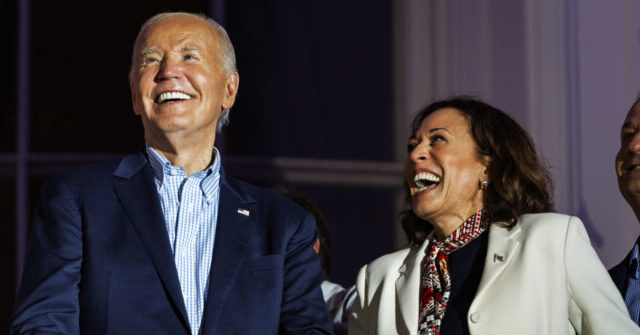
Democrats hope voters will forget the critical role Kamala Harris played in passing the legislation that fueled the worst price increases in four decades.
The post Kamalaflation: How Harris Caused Inflation By Casting Decisive Votes For Biden’s Economic Agenda appeared first on Breitbart.

Democrat strategists hope that Kamala Harris can avoid responsibility for the inflation surge that soured the public on President Biden but the critical role she played in passing the legislation that fueled the worst price increases in four decades will make that a challenge.
The Biden-Harris administration’s sweeping $1.9 trillion American Rescue Plan passed a deeply divided Senate in March of 2021 only after Harris cast the tie-breaking vote in favor of the pandemic spending bill that even prominent Democrat economists had warned would overheat the economy.
Republicans voted unanimously against it, criticizing the measure as unnecessary, unaffordable, and dangerously inflationary. Even prominent economists associated with liberal politics and the Democratic Party like Larry Summers and Olivier Blanchard had warned that the American Rescue Plan could cause significant inflation. Summers called it the “least responsible” economic policy in 40 years, arguing that it would push demand beyond the capacity of the economy and lead to sustained inflation. Similarly, Blanchard expressed concerns that the scale of the spending would create significant inflationary pressures, potentially harming economic stability in the long run.
Those warnings proved prescient. Shortly after Harris cast her vote securing passage in the Senate of one of the largest increases in deficit spending in a generation, long-dormant inflation arose across the U.S. economy and pushed inflation to levels not seen in decades. By the following summer, inflation peaked at nine percent, the fastest pace of price increases since 1981.
The inflationary package, which became law after it was passed by the House and signed into law by Biden a short time later, was the first major legislative initiative of the Biden-Harris administration. Although the economy was already growing rapidly and workers were returning to work as lockdowns were lifted, the Biden-Harris administration sought to put their stamp on the recovery in hopes of denying former President Trump’s pandemic aid measures credit.
For Biden and Harris, passage of the bill was very much seen as a political necessity even if it were not economically needed. At the first Democratic presidential debate in 2019, Harris, then a senator from California, had lashed out at the Trump economy. She said that Trump’s economy was “not working for working people,” claims belied by the lowest unemployment in decades, low interest rates, low inflation, and the best wage growth in a generation.
On the campaign trail, both Harris and Biden frequently claimed, without evidence, that Trump had hurt the economy by what they characterized as an inadequate response to the pandemic. In fact, the economy grew at the fastest pace in decades in the second half of 2020 after a weeks-long but extremely deep contraction in the spring.
The Biden-Harris spending bill pumped vast amounts of public resources into the economy, including so-called “stimmie” checks of $1,400 for hundreds of millions of Americans and supersized jobless aid of $300 a week to last through the summer. It distributed money to states, schools, local governments, and small businesses in the name of pandemic relief. Those funds fueled a surge in demand at a time when the supply side of the economy was still struggling, triggering the burst of inflation that swamped the U.S. economy.
Republicans had argued that the economy did not need anything close to the size of the Biden-Harris package, in part because Congress had already enacted a series of five substantial spending bill, typically with bipartisan support. They offered substantial changes to the plan, including scaling back the overall size to a more-managable but still generous $650 billion and conditioning aid on things like schools reopening and states dropping lockdown rules.
In passing the Biden-Harris pandemic spending package without any Republican support, made possible only by Harris’ tie-breaking vote in the Senate, the Democrats were betraying promises of national unity and cooperation that Bidena and Harris had made to voters throughout the 2020 election. Only several weeks earlier, Biden had made a call for coming together a centerpiece of his inaugural address.
At the time, Harris and Biden appeared to revel in the exercise of partisan power. Senator Susan Collins said at the time that “there was no interest from Democratic leadership in negotiating a targeted, bipartisan relief package that meets the challenges at hand.” Instead, the Biden-Harris administration and Democrat leaders on Capitol Hill appeared to want a so-called “relief” package that they alone could claim credit for—a decision they would later regret when the economic consequences of inflation became politically costly.
The vote cast by Harris was not the first partisan, tie-breaking vote she cast in favor of the inflationary legislation—and it was certainly not her last. Some six weeks earlier, Harris had cast her first tie-breaking vote to approve the blueprint of the pandemic spending bill and the procedural measures that would set the stage for the Senate to be able to avoid a filibuster and pass the measure with no Republican support.
“On this vote, the yeas are 50, the nays are 50,” Harris said. “The Senate being equally divided, the vice president votes in the affirmative and the concurrent resolution as amended is adopted.”
The New York Times described the scene:
There was no mistaking the weight of those words. They advanced a hugely impactful piece of legislation, of course. But they also signaled that for two years to come, the single most influential voice in the United States may be that of Ms. Harris declaring, in the stiltedly third-person language of Senate procedure, which way the vice president votes.
As she pronounced the resolution adopted and slid her chair back from the desk, her eyes crinkled in what, behind two masks, was clearly a smile.
Over the next year-and-a-half, Harris would go on to break the centuries-old record for tie-breaking votes in favor of partisan legislation.
Her masked smile at passing the measure now seems ironic because it hung the inflationary albatross around the neck of Biden, endangering his re-election prospects even before his disastrously feeble debate performance, and now threatens her credibility as a leader who can deal with what many Americans say is the top issue facing the country going into the November election.




